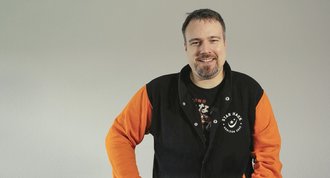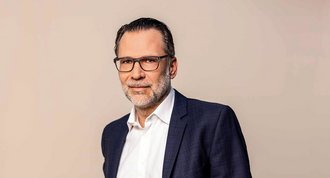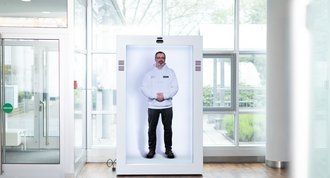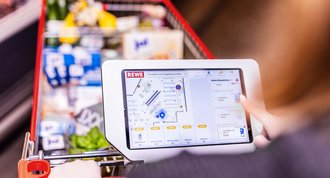
REWE digital and REWE Systems are to work even more closely together in future. We spoke to Divisional Director for Customer, Analytics & Technology, Christoph Eltze, about the importance of powerful IT for competition, transformation processes and working at eye level.
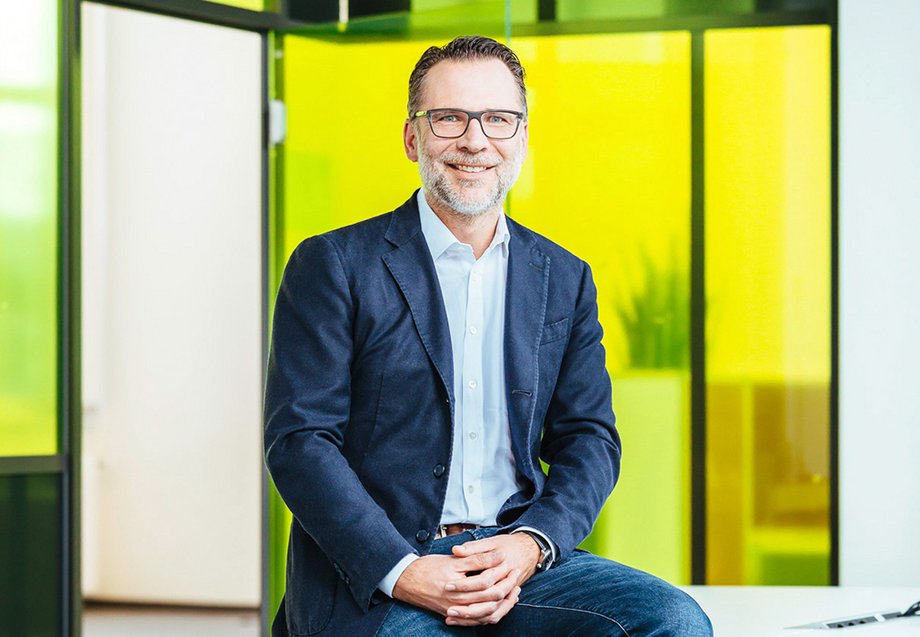 Christoph Eltze, Divisional Director Customer, Digital & Technology
one: Mr Eltze, REWE Digital and REWE Systems will be working even more closely together in future. What challenges are you facing in this regard? And what opportunities does this present?
Christoph Eltze, Divisional Director Customer, Digital & Technology
one: Mr Eltze, REWE Digital and REWE Systems will be working even more closely together in future. What challenges are you facing in this regard? And what opportunities does this present?
Christoph Eltze: We can see that technology and digitalisation are becoming increasingly important in retail. Companies need a successful and well-organised technology unit in order to remain competitive.
We now have two IT units in our German food retail organisation, both of which have set themselves the goal of creating a great shopping experience for customers: REWE Systems comes from traditional bricks-and-mortar retail, while REWE digital was deliberately founded to push online retail. What they both have in common is that they put the customer at the centre. In view of our omni-channel strategy, in which we bring together bricks-and-mortar and online retail, it is only logical that the two units will work more closely together in future.
one: What exactly does this mean for the business partners within REWE Group?
Christoph Eltze: First of all, REWE digital and REWE Systems have already worked together on a number of projects. Good examples are the Pick & Go store in Cologne or Scan & Go - and these are just the best-known projects. That's why we know that we can work even better together with our business partners and implement ideas in a more targeted manner by integrating REWE Systems and REWE digital more closely.
one: What expertise does REWE Systems contribute here and what expertise does REWE digital contribute? Or to put it another way: where do REWE Systems and REWE digital complement each other? Where do you see the greatest potential for synergies in the first step?
Christoph Eltze: REWE Systems is the IT organisation that helped to build up and advance the German food retail sector. We therefore have in-depth and important expertise here in terms of processes in this area. In addition, Systems has modernised its structures and processes in recent years and repositioned itself for the constantly changing requirements and challenges in the IT world.
REWE digital has a completely different background: it was founded in 2014 with the task of establishing a new IT landscape for the digital omnichannel business. Right from the start, the work here was product-orientated. In the IT environment, this means that the focus is on end customers and user-centricity.
In this respect, both IT units have a different history and the focus in terms of content is also slightly different, but the product-oriented, agile organisational form is now the same. This means that both units can now work together on content-related topics on the basis of the same structures.
„In the project, we work on an equal footing to achieve even better performance for the business partner in the company and ultimately for the end customer“

one: Against this different historical background of the two units: What role do cultural changes play in this transformation process?
Christoph Eltze: There are cultural differences within every company - even within the Holding or Retail Germany and within and between the two IT units. That is quite normal. But the more and the more intensively the units work together, the more important it is to have a common understanding of working methods. Especially when it comes to agile working, we have to make sure that we achieve a common definition of basic values. In my view, this has a lot to do with getting to know each other and openness.
one: What does this cultural transformation also mean in terms of the effectiveness of the IT units?
Christoph Eltze: As I said, those who work together have to enter into dialogue with each other, get to know each other and define how they want to deal with each other. This is not an end in itself, but always takes place with the aim of improving and working together in a spirit of trust. Ultimately, we will all - from Systems and Digital - be part of a joint IT system that will be awesome.
The project, which will bring the two units closer together, has equal representation, which means that here, too, we are working together as equals to achieve an even better outcome for the IT units themselves, our business partners in the company and ultimately, of course, for our end customers.
„We are convinced that now is the right time to bring the two IT organisations closer together“

one: Not so long ago, REWE Systems completed a transformation process towards a product-oriented and agile organisation as part of the Symphony project. REWE digital has also been part of various transformation processes in recent years. Now comes the next project. Will the employees still be able to keep up?
Christoph Eltze: Symphony has been formally completed, but we realise that the new structures and processes still have some way to go for employees. A company cannot manage such a transformation overnight. The same applies to REWE digital, which is also coming out of a transformation process, albeit one of continuous change in faster cycles.
Nevertheless, we are convinced that now is the right time to bring the two organisations closer together. Why should we wait to set up our IT perfectly for the future if we can already describe the target image - albeit roughly at first?
At the same time, we do not negate the fact that these change processes demand a lot from employees and we value this. But anyone who works in IT and retail also knows that change is part of day-to-day business here. Due to digitalisation and constant technological innovations, customer needs are evolving ever faster. The cycles of change are becoming shorter and shorter. We have to take this into account in the organisation of our IT.
one: How will REWE Group benefit from this transformation? What potential does the close cooperation between the two IT units harbour for the entire REWE Group and its SBUs?
Christoph Eltze: We will join forces and increase our efficiency. Because we believe that technology is an important success factor for the entire company. This will ensure the competitiveness of our core business. Pick & Go is just one prominent example of the results that constructive cooperation between REWE Systems and REWE digital can lead to. At the end of the day, there are many things we can tweak to improve the availability of goods, forecasting and logistics tools, for example.
It is also clear that if we become stronger overall and act as a more powerful unit, we can also increase our attractiveness as an employer.
Above all, however, the customer experience takes centre stage. We need to intelligently combine our knowledge of their wishes with the right technology so that we can continuously improve the shopping experience.
Christoph Eltze has been Divisional Director Retail Germany for Customer, Analytics & Technology since 1 March 2020 - in addition to his role as a member of the managing directors of REWE digital GmbH.
From 1 July 2022, he will become REWE Group's Management Board member for IT and Customer Analytics & Technology.
ENGLISH VERSION
In the future, the close collaboration between REWE digital and REWE Systems is set to be even closer. We spoke to the REWE Group's future board member for IT and Digital, Customer & Analytics, Christoph Eltze, about the impact of a dynamic IT organisation on competition, transformation processes and collaborative working.
one: Mr Eltze, REWE digital and REWE Systems will be collaborating even more closely in the future. What challenges does this pose for you? And what opportunities does it create?
Christoph Eltze: It is clear that digitalisation and the proliferation of technology are becoming increasingly important in the retail sector. In order to compete, businesses need a successful, well-organised technology unit.
Within our German organisation's food retail business, we currently have two IT departments. Both have set themselves the goal of creating an outstanding shopping experience for customers. REWE Systems has its background in conventional store-based retail, while REWE digital was set up with the specific aim of accelerating our online business. Customer centricity is the common strand that unites the two. In view of our omnichannel strategy, which sees us combining our store-based and online retail, it is only logical that the two units will work together more closely in the future.
one: What exactly does this mean for the business partners within the REWE Group?
Christoph Eltze: First of all, REWE digital and REWE Systems have already been collaborating on projects more frequently. The Pick & Go store in Cologne and Scan & Go are the best-known examples, but there are many others. This experience has shown us that we can collaborate even more effectively with our business partners and implement ideas in a more targeted manner by integrating REWE Systems and REWE digital more closely.
one: What specific expertise do REWE Systems and REWE digital offer respectively? In other words, how do REWE Systems and REWE digital complement each other? Where do you see the greatest potential for synergies at this initial stage?
Christoph Eltze: REWE Systems is the IT organisation which helped to build and advance the German food retail business. We therefore have significant in-depth knowledge of the processes in this area. Furthermore, Systems has modernised its structures and processes in recent years (through Project Symphony) and has undergone restructuring in order to take on the ever-changing challenges of the IT sector.
REWE digital's background is completely different. It was set up in 2014 with the aim of creating a new IT landscape for the digital omnichannel business. Its work has been product-oriented from the outset. In the IT environment, this means that customers and user-centricity are the focus.
To this extent, the two IT units both have different backgrounds and a different technical focus, but their product-oriented, agile organisational structure is now the same, which ensures that they can use this common structure to work together on technical issues.
„The units collaborate as equals on the project to deliver even better outcomes for the business partner in the company and, ultimately, for the customer.“

one: In light of the clear differences in the historical background of these units, what is the role of cultural change in this transformation process?
Christoph Eltze: There are cultural differences within every company - including the German Holding or retail business, and both within and between the two IT units. It's completely normal. But as the units begin to collaborate more often and more intensively, it will be increasingly important for the individuals to share a common understanding of working methods. Particularly in the case of agile working methods, we must ensure that we achieve a common definition of core values. As I see it, a lot of that is down to getting to know each other and being open.
one: What are the implications of this cultural transformation in terms of the effectiveness of the IT units?
Christoph Eltze: As I said, people who work together have to communicate with each other, get to know each other, and define how they want to deal with each other. This is not an end in itself. Instead, the goal in mind is always to improve and work together in a spirit of mutual trust. Ultimately, all of us - from Systems and from Digital - are becoming part of a collaborative IT team that's shaping up to be awesome!
The two units are equally represented in the project through which they are becoming more closely aligned. Once again, this illustrates that we are working together and collaborating to achieve an even better outcome for the IT units themselves, for our business partners in the company and, ultimately of course, for our customers.
„We believe that now is the right time for the two IT organisations to become more closely aligned.“

one: Not too long ago, as part of Project Symphony, REWE Systems underwent a process of transformation that turned it into a product-oriented, agile organisation. REWE digital has also been involved in various transformation processes in recent years. This latest project is now upon them - are the employees still on board?
Christoph Eltze: While Symphony has officially concluded, it's clear to us that our employees still need to be further embedded into the new structures and processes. Companies cannot implement this type of transformation overnight. The same is true of REWE digital, which has also just undergone a transformation process, albeit a process of continuous change in faster cycles.
Nonetheless, we believe that now is the right time for the two IT organisations to become more closely aligned. What is the point of waiting to create our ideal future IT set-up, when we already know what we want to achieve, even if the details still have to be fleshed out?
At the same time, we do not deny that these change processes demand a lot from employees, and we appreciate that they may have concerns. But anyone who works in IT and in retail knows that change is part and parcel of day-to-day business. Digitalisation and constant technological innovations mean that customer needs are evolving ever faster and change cycles are becoming ever shorter. We have to account for this when organising our IT.
one: How will the REWE Group benefit from this transformation? What potential does the close collaboration between the two IT units bring to the REWE Group as a whole and its SGEs?
Christoph Eltze: We are joining forces and increasing our efficiency. We believe that technology is a crucial factor in the success of the entire company. It ensures that our core business remains competitive. Pick & Go is just one oft-stated example of what can be achieved when REWE Systems and REWE digital collaborate constructively. In the end, there are a great many parameters that we can tweak in order to improve product availability and our forecasting and logistics tools.
It is also clear that if we are stronger overall and act together as a more efficient unit, this will make us a more attractive employer.
Above all, however, our focus is on the customer experience. We must adopt a smart approach to combining our understanding of what customers want with the right technology so that we continually improve the shopping experience.

